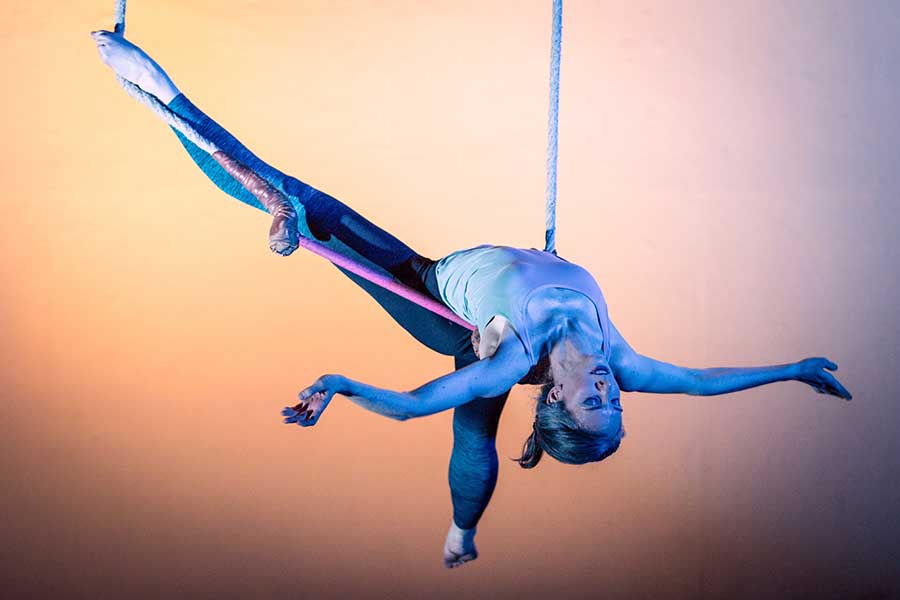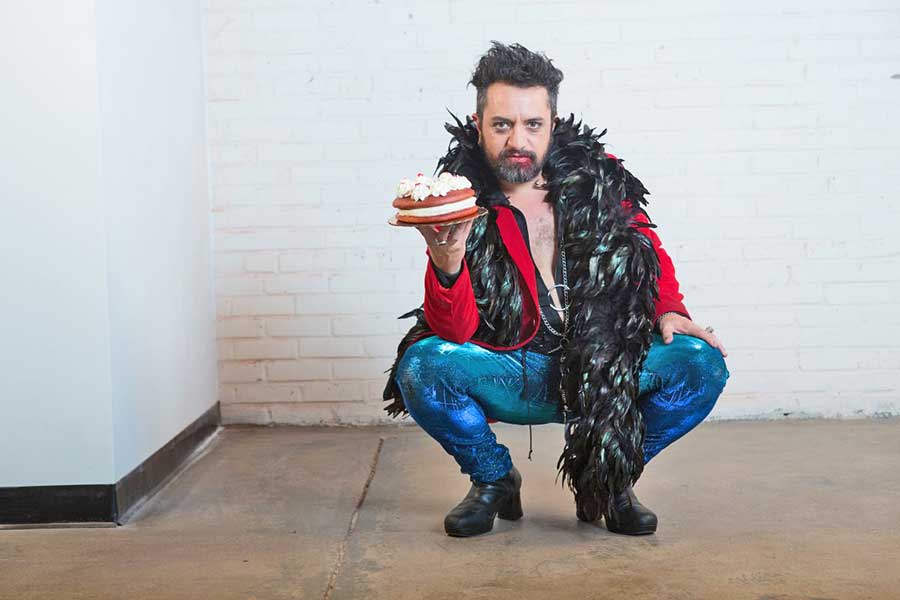
Not so long ago, the artistic director of Philly’s queer-centric The Bearded Ladies cabaret and his associate took a trip through Europe, literally and figuratively.
From the past Paris of Le Chat Noir to Berlin’s Weimar nightlife, all while peeking into 21st-century drag, John Jarboe and Sally Ollove came up with “Do You Want A Cookie?”
This multi-day, multi-room showcase at an abandoned warehouse-turned-nightclub in Callowhill — an installation that Fringe Fest CEO Nick Stuccio said is like nothing else the Fringe has witnessed — sees the live culmination of this multi-year study of cabaret’s history and evolution in relation to The Bearded Ladies and their friends from around the globe, many of whom will offer extended cabaret acts as Late Night Snacks after each night’s main event. Jarboe and Ollove discussed the extravaganza.
PGN: The last time PGN interacted with you, you were launching “You Can Never Go Down the Drain” as Mx. Rogers at Wilma Theater. Has being the non-binary Rogers rubbed off on anything related to this Cookie project?
JJ: Exploring the role of irony and earnestness, as I did in Mx. Rogers, has certainly changed how I direct and perform in “Cookie.” How can we use humor and performance responsibly? How can we take care of our audiences? Offer joy, thoughtfulness and questions.
PGN: Is it necessary for you two to connect the dots between one Bearded Ladies project to the next?
SO: We are an ongoing experiment, so I would say that the dots between projects connect through the core company who make up the Bearded Ladies and the questions we are asking ourselves. The last few projects have really centered on how we as artists relate to our current socio-political moment, whether we realized that at the time of making or not.
PGN: How is this new work, “Cookie,” reflective of what goes on within the socio-politics of LGBTQ-ism at present?
JJ: So many cabaret performers are misfits, or not even that. We are misfits’ misfits: the people who thought they were going to go into dance or theater or opera, but who didn’t quite fit or want to fit. The cabaret form is a queer form in that it lives in the liminal space between and among larger, more-resourced and considered forms. So it’s not surprising that many practitioners of the form are queer. It is a perfect form for those that don’t want to do what is prescribed, who want dynamic connection to community as much as they want to make art.
PGN: How is “Cookie” connected to your travels around the globe to discover the soul of cabaret?
SO: Being in the places and meeting the artists who live there informed our understanding of how cabaret manifested in each of these places — not to mention the resources that we could access only in those locations: archives, libraries, personal histories and just wandering through the landscape.
PGN: What was cabaret in your estimation before your trek and what is cabaret now that you have delved deeper?
JJ: Cabaret is much more versatile, adaptable and global than we ever thought at the beginning of this project. We were worried when we started that the history was erased or inaccessible but, in fact, there are so many stories lurking under the surface, so much history, that it can be beautifully overwhelming.
PGN: How do you operate in a manner you believe to be different than any other company? Or is that not the point?
JJ: I think the point of this project is that it is not just us. There exists an amazing community already. We are in the privileged position to get the support to bring some of this community together. I also feel strongly that to practice a form, you have to honor its history and ancestors.
SO: It is important that this exploration be done by practicing cabaret artists rather than scholars. The history lives differently in us because these are our ancestors and our colleagues. We spent a lot of time with the “Cookie” performers sharing the history as we learned it and hearing from them about their personal history with the form, their ancestors in performance, and their stories about cabaret history in their hometowns. As we met more and more artists during our travels, we discovered numerous amazing cabaret performers who felt just as isolated from their colleagues and ancestors as we did. We see this project as an attempt to form a community of artists who often perform solo.
PGN: How did you select the crew of contributors to “Cookie,” with whom there will be individual Late Night Snacks? Some I know; some are strangers.
SO: We met these artists on our travels and felt that they had something to offer us in terms of a contemporary idea of what cabaret can be. They represent geographic areas with strong historical or contemporary cabaret scenes.
JJ: There is a lot of group work, collaboration and play.
PGN: What should we gather about The Bearded Ladies after “Cookie” that we might not have known before?
SO: Like all good cabaret, each night will be different because each audience is different, and the audience is such a huge ingredient in this art form. But the dominant structure of both the larger performance and the individual artist’s performances within that larger framework will remain the same. If you want to try to catch everything, you’ll need to come three times.
JJ: It’s important to note that everyone gets a drink with their ticket.
“Do You Want A Cookie?” by The Bearded Ladies Cabaret runs Sept. 7-16. with showings at 7:30 and 10:30 p.m. at 448 N. 10th St. Tickets are $35. For more, visit fringearts.com/event/do-you-want-a-cookie/.
